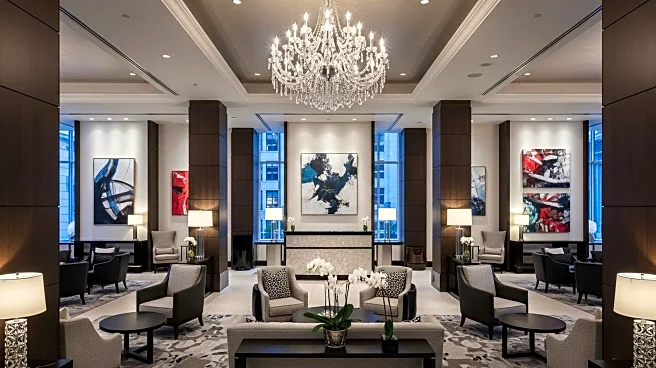What's Happening?
W Hotels, part of Marriott Bonvoy's portfolio, has announced the completion of a $100 million transformation of the W New York – Union Square. This iconic 256-room hotel, located in the heart of New York City, has undergone a comprehensive room-to-rooftop reinvention. The transformation aims to redefine the hotel as a cultural cornerstone, reflecting W Hotels' global evolution in design, culture, and service. The renovation highlights the hotel's historic architecture, particularly in the Living Room, which serves as a dynamic space for locals and travelers. The redesign was led by Rockwell Group, drawing inspiration from Union Square Park's textures and tones.
Why It's Important?
The transformation of W New York – Union Square is significant as it marks a pivotal moment in W Hotels' global brand evolution. By investing $100 million into this project, W Hotels is reinforcing its commitment to luxury lifestyle hospitality and cultural engagement. This renovation not only enhances the guest experience but also positions the hotel as a vibrant hub for cultural programming, including live music and art activations. The project reflects a broader trend in the hospitality industry towards immersive and culturally integrated experiences, potentially influencing other luxury brands to adopt similar strategies.
What's Next?
Following the transformation, W New York – Union Square is set to introduce new features such as Seahorse, a modern seafood brasserie, and Union Square's only rooftop bar. These additions are expected to attract both locals and tourists, further establishing the hotel as a key player in New York City's hospitality scene. The transformation is part of a larger multi-year evolution of W Hotels, with plans to renovate 80% of its global portfolio by 2028, including marquee properties in North America and new international openings.
Beyond the Headlines
The renovation of W New York – Union Square highlights the importance of preserving historical architecture while integrating modern design elements. This approach not only respects the building's heritage but also enhances its appeal to contemporary travelers. The project underscores the growing demand for hotels that offer unique, culturally rich experiences, which can lead to increased competition among luxury brands to innovate and differentiate themselves in the market.









